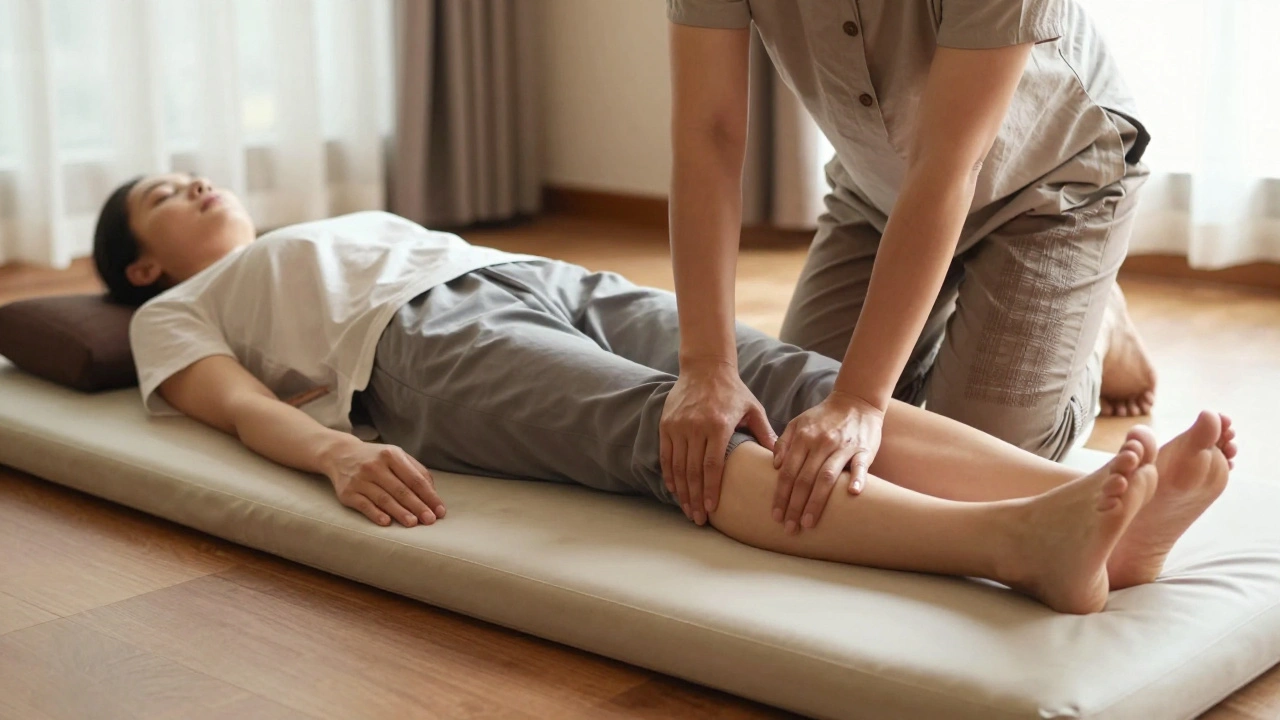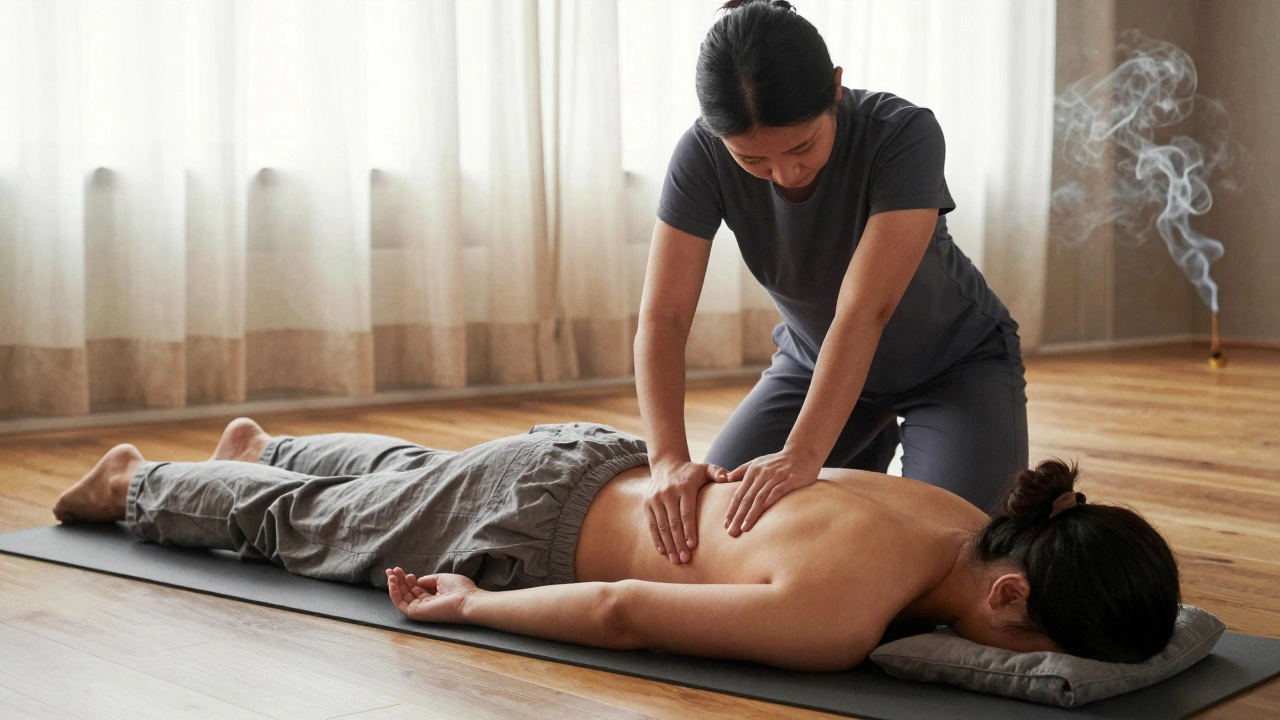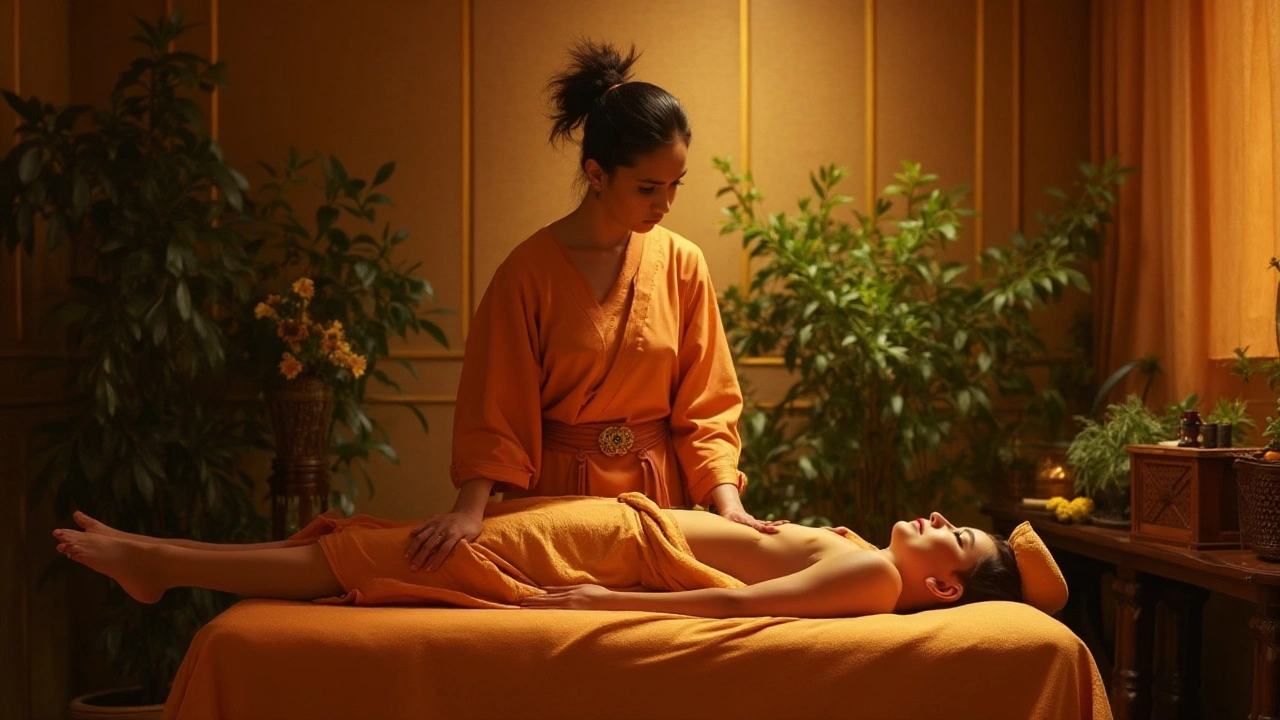Discover how authentic Thai massage in London can melt away stress, improve mobility, and reset your nervous system-all without oils or undressing. Find top spots, pricing, and what to expect.
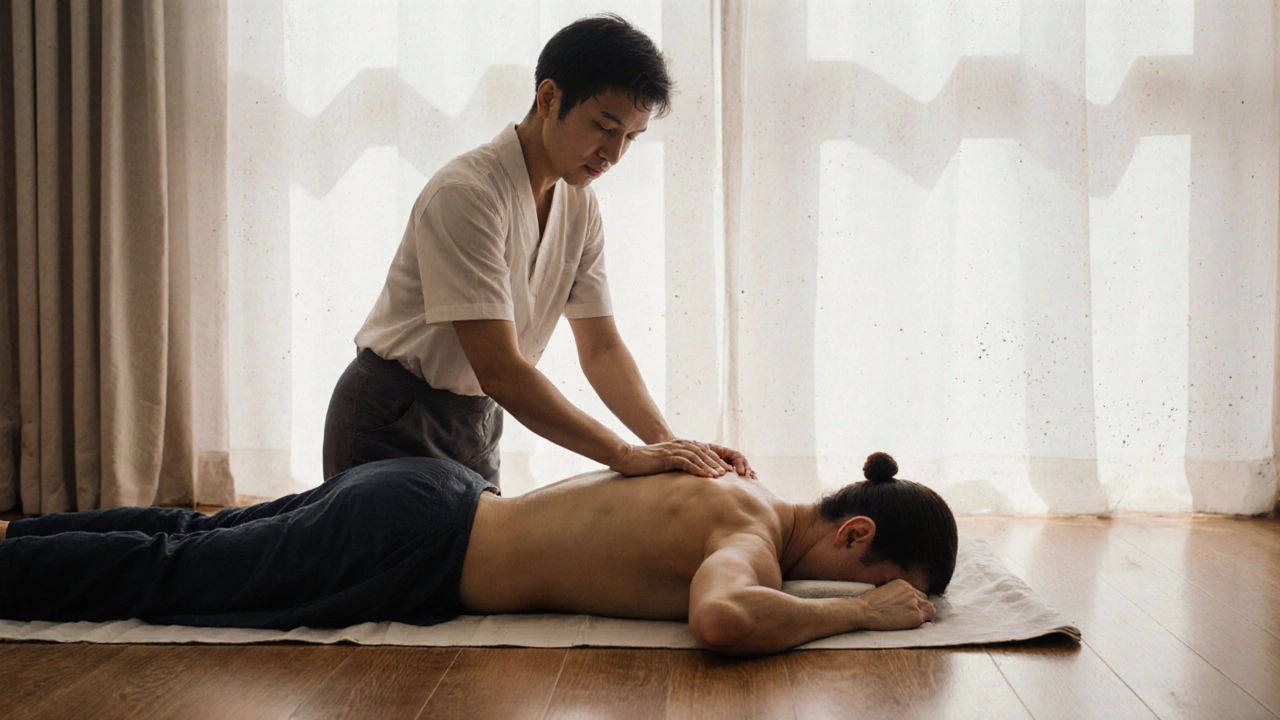
- Created by: Liam Redgate
- Completed on: 23 Nov 2025
- Categories: Thai Massage
You’ve had a long week. Your shoulders are tight, your mind won’t shut off, and no amount of scrolling or coffee seems to help. What if you could reset your body and mind in just 60 minutes-no pills, no screens, just hands, pressure, and ancient technique? That’s what Thai massage in London delivers, if you know where to find the real thing.
What Is Authentic Thai Massage?
Thai massage isn’t just another massage. It’s a full-body experience that blends acupressure, assisted yoga postures, and energy line work. Unlike Swedish or deep tissue, you stay fully clothed-usually in loose cotton pants and a top-and the therapist uses their hands, thumbs, elbows, knees, and even feet to guide you through stretches and apply rhythmic pressure.
This isn’t a new trend. It’s over 2,500 years old, rooted in Ayurvedic medicine and Buddhist spiritual practices. In Thailand, it’s called Nuad Boran, which means ‘ancient massage.’ It’s not about relaxation alone-it’s about restoring balance in your body’s energy flow, called Sen lines. Think of it like a physical reset button for your nervous system.
Most places in London call themselves ‘Thai massage’ but only a few do it right. Authentic sessions use no oils, no music with heavy beats, and no dim lighting meant to feel like a spa fantasy. It’s grounded, intentional, and physically demanding-in the best way.
Why Thai Massage Works When Nothing Else Does
If you’ve tried foam rollers, yoga apps, or even chiropractors and still feel stiff, Thai massage might be the missing piece. Here’s why:
- It releases deep tension-not just in muscles but in connective tissue. A 2021 study in the Journal of Bodywork and Movement Therapies found Thai massage significantly reduced chronic lower back pain in participants after just four sessions.
- It improves mobility-you’ll notice you can turn your head more easily, bend down without groaning, or reach for that top shelf without wincing.
- It calms your nervous system-the rhythmic pressure and stretches activate the parasympathetic response. Your heart rate slows, your breathing deepens, and your brain stops replaying that work email from 3 p.m.
- No downtime-you don’t need to rest afterward. You leave feeling energized, not groggy.
I’ve seen clients come in after 12-hour shifts at Canary Wharf, barely able to walk. After one session, they’re walking out smiling, saying, ‘I didn’t know my hips could move like that.’
Where to Find Real Thai Massage in London
Not every ‘Thai massage’ studio in London does it the traditional way. Some mix it with aromatherapy, add hot stones, or use too much oil. That’s not Thai massage-it’s a hybrid. Here’s where to look for authenticity:
- Chinatown-This is where the oldest Thai-owned schools in London operate. Look for places run by Thai therapists who trained in Bangkok or Chiang Mai. Wat Thai London runs certified sessions every weekend.
- Camden-A few hidden gems here, especially on Hawley Road. These therapists often have 10+ years of experience and still follow the traditional sequence.
- Islington-Thai Bodyworks on Upper Street is known for its no-frills, no-photos-on-the-wall approach. They don’t advertise much, but locals swear by it.
- Southwark-Near London Bridge, Sen Therapy offers sessions with therapists who trained at the Wat Po temple in Bangkok. Ask for ‘Wat Po style’-it’s the gold standard.
Pro tip: Check the therapist’s bio. If they mention ‘certified by Wat Po’ or ‘trained in Chiang Mai,’ that’s a good sign. If it just says ‘experienced in Thai techniques,’ keep looking.
What Happens During Your First Session
You walk in, remove your shoes, and sit on a mat on the floor. No table. No candles. Just a quiet room with a thin cotton sheet. The therapist will ask you a few questions: where you’re tight, if you’ve had injuries, if you’re pregnant, etc.
Then it begins. You lie on your back. They start at your feet, pressing along the energy lines with their thumbs. You might feel a deep ache-it’s not painful, but it’s intense. That’s your body releasing years of holding tension.
Next, they guide you through stretches. One moment you’re lying still; the next, they’re gently pulling your leg toward your chest, then rotating your hip. You don’t have to do anything. Just breathe. Let them move you.
Halfway through, you flip onto your stomach. They work your back, shoulders, and neck with their elbows-yes, elbows. It sounds brutal, but it’s precise. You’ll feel a release you didn’t know was possible.
At the end, they sit beside you, place their hands gently on your forehead, and say, ‘Breathe.’ That’s it. No music. No chimes. Just quiet.
Most people leave feeling taller, lighter, and oddly calm. Like your body finally remembered how to relax.
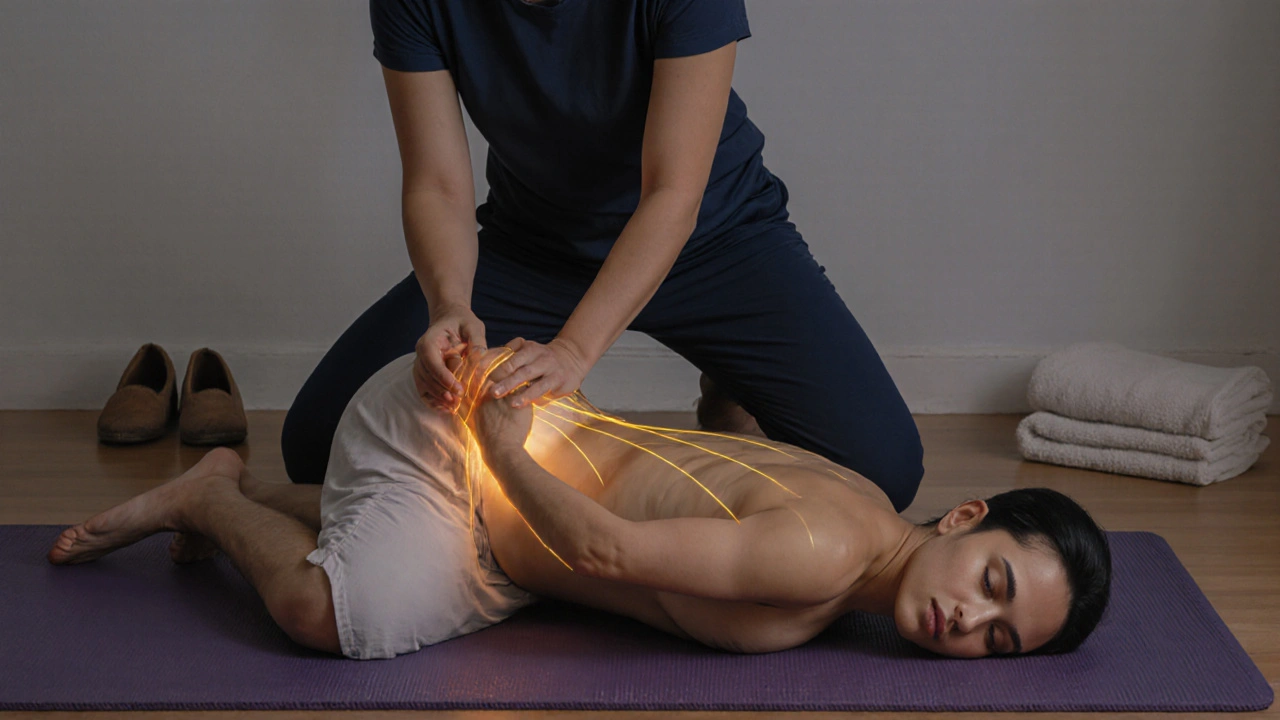
How Much Does It Cost in London?
Prices vary wildly depending on where you go.
| Location Type | 60-Minute Session | 90-Minute Session | What You Get |
|---|---|---|---|
| High-end spa (Mayfair, Knightsbridge) | £120-£180 | £180-£250 | Added aromatherapy, robes, tea, plush setting |
| Standard clinic (Camden, Islington) | £70-£95 | £95-£130 | Authentic technique, no frills |
| Authentic Thai studio (Chinatown, Southwark) | £60-£80 | £85-£110 | Traditional Wat Po or Northern style, therapist trained in Thailand |
Don’t be fooled by cheap deals under £50. Thai massage requires skill, strength, and training. A £40 session usually means a part-timer with three weeks of online training. You’re paying for expertise, not just time.
How to Book and What to Bring
Most authentic Thai massage studios don’t use Booking.com or Google Ads. They rely on word of mouth.
- Call ahead. Many don’t have websites. Just pick up the phone.
- Ask: ‘Do you follow Wat Po or Northern Thai style?’ If they hesitate, move on.
- Wear loose, stretchy clothes. No need to buy special gear-your yoga pants will do.
- Don’t eat a heavy meal two hours before. A light snack is fine.
- Arrive 10 minutes early. This isn’t a rush job.
Bookings are often done by appointment only. Weekends fill up fast. If you want a Friday evening slot, call on Monday.
What to Avoid
Not every ‘Thai massage’ is safe or real. Here’s what to watch out for:
- Too much oil-Traditional Thai massage uses no oil. If you’re being rubbed with coconut or lavender oil, it’s not authentic.
- Music with nature sounds-Real Thai massage is silent or has quiet ambient tones. Loud rain or Tibetan bowls? That’s spa fantasy.
- Therapists who don’t use their body-If they only use hands, they’re not doing Thai massage. They’re doing something else.
- Locations in residential flats with no signage-This isn’t always bad, but if they don’t have a name, a license, or reviews, be cautious.
Trust your gut. If it feels more like a hotel room than a healing space, walk out.
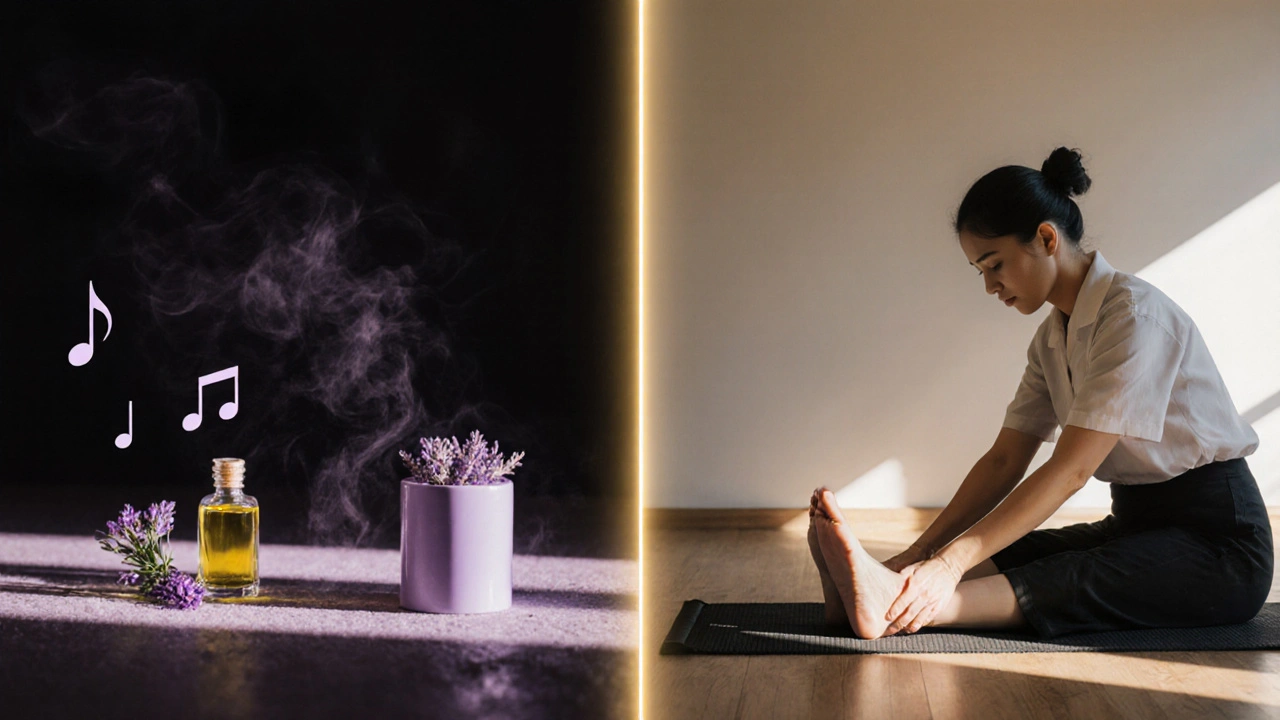
Thai Massage vs. Swedish Massage in London
| Feature | Thai Massage | Swedish Massage |
|---|---|---|
| Style | Active stretching, acupressure, energy lines | Gliding strokes, kneading, light pressure |
| Clothing | Full clothing (cotton pants/top) | Nude under towel |
| Oil Used | No | Yes |
| Setting | Mat on floor | Table in quiet room |
| Best For | Chronic stiffness, mobility, energy blockages | Relaxation, stress relief, surface tension |
| Post-Session Feel | Alert, stretched, energized | Soft, sleepy, relaxed |
Swedish is great if you want to melt into a pillow. Thai massage is for when you need to wake up your body.
Frequently Asked Questions
Is Thai massage painful?
It can feel intense, especially if you’re stiff, but it shouldn’t hurt. A good therapist will check in-‘Is this okay?’-and adjust pressure. If you’re wincing or holding your breath, speak up. The goal is release, not punishment.
Can I get Thai massage if I’m pregnant?
Yes-but only with a therapist trained in prenatal Thai massage. Avoid deep hip or abdominal work. Many studios in Islington and Camden offer modified sessions. Always tell them you’re pregnant before they start.
How often should I get Thai massage?
Once a month is ideal for maintenance. If you’re dealing with chronic pain or sitting at a desk all day, once every two weeks helps. Don’t go more than twice a week-it’s a deep reset, not a daily habit.
Do I need to be flexible?
No. Thai massage works with your current range of motion. The therapist adapts to you-not the other way around. If you can’t touch your toes, that’s fine. They’ll work within your limits.
Why do some Thai massages feel like a workout?
Because they are. Thai massage is like passive yoga. You’re being stretched, twisted, and compressed in ways your body hasn’t moved in months. It’s not supposed to be easy-it’s supposed to realign you. The next day, you might feel sore. That’s your body adjusting.
Ready to Feel Different?
Thai massage isn’t a luxury. It’s a repair tool for modern life. If you’re tired of feeling like your body is holding onto stress, it’s time to try something that actually works. Find a place that trains its therapists in Thailand. Book a 60-minute session. Wear your comfy clothes. Show up. Breathe. Let them move you.
Afterward, you might not know why you feel lighter. But you’ll know you haven’t felt this calm in a long time.
Discover the real benefits of Thai massage in London-from pain relief to improved flexibility. Learn where to find authentic sessions, what to expect, and how it compares to Swedish massage.
Discover London's hidden gems offering the art of Thai massage, where the mind meets tranquility and the soul surrenders to the caress of skilled hands. These retreats promise an escape from the urban chaos, inviting relaxation and sensual indulgence. Unearth places that weave ancient traditions with modern luxuries. Let every touch guide you to a realm where serenity and sensuality intertwine perfectly.

